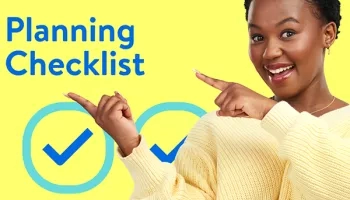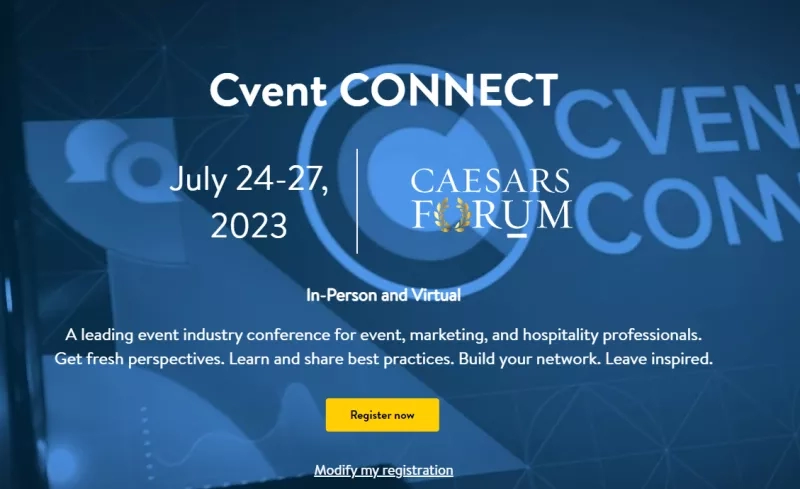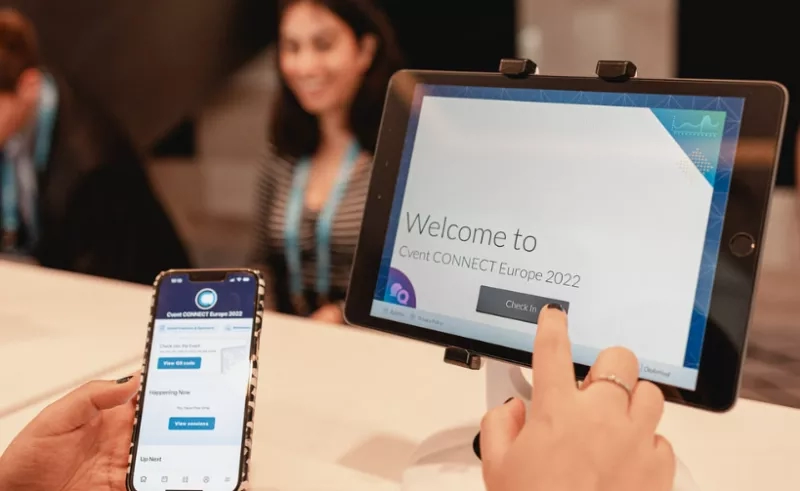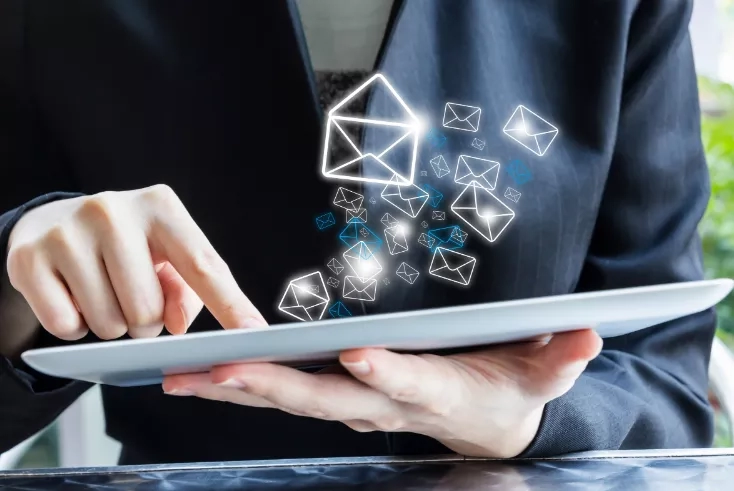
In the world of B2B events, effective communication is the name of the game. Any breakdown can lead to issues that can potentially impact your future events.
So, whether it's smoke signals, Slack, or any other tool, ensure you have a solid communications plan before, during, and after the event. And in this guide, we'll help you create one. So keep reading.
What is Event Communication?
An event communication plan is like a roadmap for getting the word out about event.
Let's say you wanted to throw a killer birthday bash for a friend. You'd send out a save-the-date to let everyone know the celebration was on. Then, you'd send out the invites with all the necessary info, like the time, date, and party type (will it be a fancy sit-down dinner, a casual BBQ, or something in between?). You'd keep track of RSVPs to know who was coming and send out a reminder a week or so before the big day.
After the party, you can send out thank-you notes to show appreciation to everyone who came.
Now, imagine that instead of a birthday party, you're planning a corporate event. Whether it's a networking meetup, webinar, trade show, or conference, you'll want to create a similar communication plan that maps out your messaging strategy.
Why is Communication Important in Events?
When it comes to SI, time is precious. Meeting your deadlines is non-negotiable and when missed could be disastrous, especially when the dates are set in stone.
To make sure everyone involved is on the same page, clear communication is a must. Crafting an event communication plan clarifies tasks and responsibilities and can boost productivity, keep your event on track, and in the end, make it a success.
Check out these helpful tips for effective communication in event management that will save you some headaches at your future events:
Information to Communicate Before the Event
Your pre-event communication should cover the following essentials:
- Presenter Information: Share the presenters' names to generate excitement among attendees and keep everyone informed.
- Event Schedule: Provide a detailed timeline of the event's activities and presentations so that attendees can plan accordingly.
- Communication Channels: Clearly define communication methods for in-person, hybrid, or virtual events, and utilize digital tools (social channels) and mobile apps.
- Food and Beverage Arrangements: If food and drink are or are not available, communicate this information to attendees to help them make proper arrangements.
Communication Timeline
When planning your event's communication strategy, it's essential to keep your timelines in mind. Critical deadlines, such as ticket sales, speaker signings, and event programming decisions, will influence your marketing agenda and communication schedule. Here are some general timeline rules to follow:
Announce the event to the public at least 12 weeks prior.
For the next 10 weeks or more, focus on executing your marketing campaign and developing a strategy for communicating information. It's essential to be strategic about releasing information since you won't have all the details at once.
Keep other teams involved in the event informed so they can share any additional information you might overlook.
During the week of the event, communicate all vital information directly with attendees. This will ensure that everyone is aware of any last-minute changes or important details that they need to know.
Pre-Event Communication Tools
Technology has made pre-event communication easy and reliable. Consider the following options for your event communication strategies leading up to your event:
Event Website: Make your event website the first stop for anyone looking for your event information. Ensure all necessary information is readily available and all other communication tools funnel to your website.
Email Marketing: Use email to reach a wide audience unobtrusively. Consider using an event email marketing tool to automate the process and keep your potential attendees up-to-date with regular updates.
Social Media: Promote your event on social media platforms such as Twitter, Instagram, Facebook, and LinkedIn. Each channel has unique demographics (Tik Tok anyone?), so tailor your marketing strategies to appeal to a large audience.
Mobile Event App: Encourage potential attendees (and those already registered) to download your event app. This can be incredibly effective in communicating with everyone involved in your event. Use it to create polls, surveys, and group chats to build buzz and engage with your audience and team pre-event.
During the Event
Information to Communicate During the Event
When the day of your event finally arrives, effective communication remains just as crucial, although it takes on a slightly different form. As attendees and staff navigate the event, they will have questions and concerns that must be addressed promptly. Delayed responses can quickly lead to frustration and may even impact your event’s success.
Here's what you need to communicate during the event:
Your team members should be on the same page about where and when they need to be. This includes everything from when to post social media announcements to when to open live polls for attendees and, most importantly, when each presentation starts.
The last thing you want is your team to be caught off guard, causing confusion and delays.
Communication Tools To Use During The Event
Here are some helpful event communication tools you can utilize during your event.
Mobile Event App: Ask your attendees who haven't done so yet to download your app to access important event-related information such as speaker bios, agendas, sessions, room updates, etc.
Live Polling: Conducting a live polling survey is an excellent event communication strategy that allows you to collect real-time feedback and address any problems that arise. You can quickly implement this through the mobile event app.
Push Notifications: Push notifications prevent event attendees from getting distracted and missing out on a presentation, or make them aware of any changes. Whether your event is hybrid, in-person, or virtual, push notifications are useful to keep everyone on track.
Social Media: While social media is essential to utilize before the event, it can also come in handy during the event. You can use your Twitter account to post real-time updates or live-stream portions of the event on Instagram. Social media integration makes this process seamless.
After the Event
One of the most important thing to do after the event is over is to thank everyone involved in your event's success, including your event team, vendors, and attendees.
Showing appreciation for their hard work and involvement will go a long way in building stronger relationships with them. It's a simple yet effective way of letting them know their contributions were valued and recognized.
Communication Tools To Use After The Event
After your event, there are various tools that you can utilize to communicate with your attendees and gather valuable feedback.
Post-Event Survey Feedback: Besides any surveys conducted during the event, it's important to gather feedback from attendees after the event. This feedback can help you identify areas that need improvement and give you insights into what went well.
Email Marketing Follow-Up: Regular communication with attendees after the event helps you keep in touch with your audience and provides a platform to share updates and information about future events.
Use Event Technology for Communication
Promotes sustainability
Organizing in-person events is known to have a significant carbon footprint and generate a considerable amount of waste. Event technology helps go green with digital communication that minimizes paper waste and reduces environmental impact.
Track data analytics
Event technology has revolutionized how event planners measure success by providing valuable data insights and analytics reports. It enables you to track key performance indicators such as how many people engage with your content, customer behavior, lead generation, and profit.
Boost Attendee Engagement
Event technology also improves audience engagement, a significant challenge for event planners. Organizers can use platforms for providing on-demand content, platform-based networking, and so on.
Three Things You Must Consider For Event Communication
But with so many communication tools available, how do you know which ones to use? Here are three important things to consider:
First, think about your audience. You need to know what communication methods they prefer and use most often. If you're not getting much response from your event emails, for example, you may want to explore other options that your audience is more likely to engage with.
Next, consider your timeline. Different phases of your event may require various communication tools. For example, email communications may work best before and after the event, but during the event, you might want to use more direct communication methods such as text messaging or a mobile event app. Also, use tools that allow attendees to connect, like group chat or social media.
Finally, your budget is a critical consideration. You want to make the most of your budget by selecting communication tools that are effective but affordable. Consider using pre-existing communication channels, like a company's preferred chat application or social media platform, to keep costs low. An experienced event planner can help you maximize your spending and choose the best tools for your budget.
Ready, Set: Communicate
Every event has three key stages: before, during, and after. Effective communication throughout each step helps to create a comprehensive and impactful experience for everyone involved.
You must keep the energy high during the event with live updates and social media posts that transport attendees right into the action. But once the event is over, you can dial down the intensity and create content like videos, reports, and press releases highlighting the best moments.
No matter what stage you're in, effective communication is key to the success of your event. By customizing your communication plan to fit your audience and budget, you can ensure that everyone is in on the action and having a great time. So, plan carefully, communicate effectively, and prepare to steal the show!






